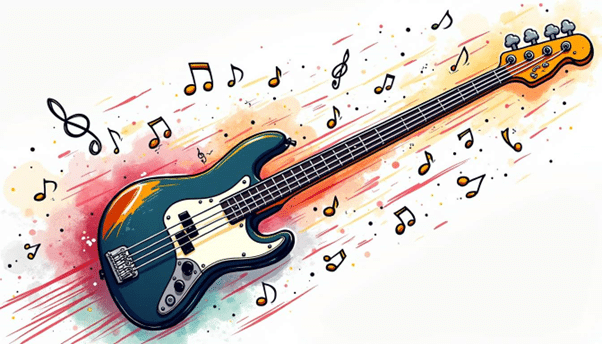Songwriting can often feel like a daunting task, especially for bass musicians who might find themselves overshadowed by more prominent instruments in a band. However, crafting compelling bass lines and songs doesn’t have to be a slow and tedious process. With the right techniques and a bit of creativity, bassists can streamline their songwriting process and produce music that resonates. This article delves into effective tips and techniques tailored specifically for bass musicians looking to enhance their songwriting speed and efficiency.
Understanding the Role of the Bass
The bass guitar serves as the backbone of any musical ensemble, providing rhythm and harmony while complementing other instruments. Understanding this role is crucial for any bassist aiming to write songs quickly and effectively.
Establishing a Solid Foundation
Before diving into songwriting, it’s essential to grasp the fundamental role of the bass in music. The bass not only supports the harmonic structure but also drives the rhythm. By focusing on these aspects, a bassist can create lines that are both engaging and functional.
Consider the genre you are working in. Different styles may require varying approaches to bass lines. For instance, funk often emphasizes syncopation, while rock might lean more towards straightforward, driving patterns. Understanding these nuances can help streamline the songwriting process. Moreover, incorporating techniques such as slides, hammer-ons, and pull-offs can add a unique flavor to your bass lines, making them stand out and enhancing the overall musical texture.
Listening and Analyzing
One of the best ways to enhance songwriting skills is through active listening. Spend time analyzing songs that feature prominent bass lines. Pay attention to how the bass interacts with other instruments, the use of rhythm, and how melodies are supported. This practice not only inspires creativity but also provides practical insights that can be applied to your own writing.
Additionally, consider exploring a diverse range of musical genres beyond your comfort zone. This exposure can introduce you to innovative bass techniques and concepts that you might not encounter in your primary style. For example, listening to jazz can reveal the intricacies of walking bass lines, while reggae might showcase the importance of offbeat rhythms. By broadening your musical horizons, you can enrich your songwriting toolkit and develop a more versatile approach to crafting bass lines that resonate with listeners.
Techniques for Speedy Songwriting
With a solid understanding of the bass’s role, it’s time to explore techniques that can help expedite the songwriting process. These methods can help bassists generate ideas quickly and efficiently.

Utilizing a Loop Pedal
A loop pedal can be a game-changer for bass musicians. By allowing you to record and layer bass lines in real-time, a loop pedal provides immediate feedback and encourages experimentation. Start by laying down a simple groove, then build upon it by adding harmonies or counter-melodies. This approach can lead to spontaneous ideas that might not surface during traditional songwriting methods. Additionally, looping can help you hear how different bass lines interact with one another, which can inspire new directions for your song. You might find that a subtle change in rhythm or a slight variation in notes can transform an ordinary line into something extraordinary, opening up new avenues for creativity.
Embracing Simplicity
When under pressure to create quickly, it’s easy to overcomplicate things. Embracing simplicity in your bass lines can lead to more effective songwriting. Start with a basic chord progression and create a bass line that complements it without excessive embellishments. Often, the most memorable songs are built on simple, catchy riffs that resonate with listeners. Moreover, a straightforward bass line allows other instruments to shine, creating a balanced mix that enhances the overall sound. Consider the classic tracks that have stood the test of time; many of them feature uncomplicated yet powerful bass lines that anchor the song and provide a solid foundation for the melody and harmony.
Setting Time Limits
Imposing time constraints can significantly enhance your productivity. Set a timer for a specific duration—say, 30 minutes—and challenge yourself to write a complete bass line or even a full song within that timeframe. This technique encourages focus and helps to eliminate distractions, allowing for a more efficient songwriting process. You may find that the pressure of a ticking clock ignites your creativity, pushing you to make bold choices that you might otherwise hesitate to explore. Additionally, after completing a session under these constraints, you can review your work to identify which ideas resonate the most, refining them further in subsequent sessions. This practice not only hones your songwriting skills but also builds your confidence in your ability to create on demand.
Incorporating Technology
In today’s digital age, technology can be a powerful ally in the songwriting process. From software to apps, various tools can help bassists streamline their creative workflow.

Using Music Software
Music production software, such as Ableton Live or Logic Pro, can be invaluable for bassists. These platforms allow for easy recording, editing, and arranging of bass lines. Additionally, built-in MIDI capabilities enable musicians to experiment with different sounds and arrangements without the need for extensive recording equipment.
Many software programs also come equipped with virtual instruments that can be used to sketch out ideas quickly. This can be particularly useful for bassists looking to explore different genres or styles without needing to master each instrument individually. Furthermore, advanced features like automation and effects processing allow for a level of creativity and polish that can elevate a simple bass line into a full-fledged musical statement. By utilizing these tools, bassists can not only refine their sound but also collaborate with other musicians remotely, breaking geographical barriers and expanding their creative network.
Unlock Your Songwriting Potential with Mobile Apps – and Expert Guidance from Russell Seow
Mobile apps like GarageBand and BandLab have revolutionized the way musicians approach songwriting. With just a smartphone, bassists can record fresh ideas on the fly—whether they’re commuting, relaxing at home, or in between rehearsals. These apps offer built-in loops, samples, chord progression generators, and even lyric writing tools that can spark inspiration and help shape complete songs with ease.
But while these tools are powerful, real progress comes from mastering the craft of songwriting—and that’s where Russell Seow comes in. As a seasoned bass guitarist and songwriting coach based in Singapore, Russell helps musicians go beyond the basics, teaching them how to structure songs, build grooves, and develop their own unique musical voice.
Ready to take your songwriting to the next level? Book a session with Russell Seow today and turn your musical ideas into full-fledged compositions!
Collaborative Songwriting
Collaboration can be a powerful tool for speeding up the songwriting process. Working with other musicians can provide fresh perspectives and ideas that might not have been considered otherwise.
Finding the Right Collaborators
When seeking collaborators, look for musicians who complement your style and strengths. Whether it’s a guitarist, drummer, or vocalist, having someone to bounce ideas off can lead to more dynamic songwriting sessions. Additionally, collaborating with musicians from different genres can introduce new elements into your writing.
Setting Clear Goals for Collaboration
To ensure productive collaboration, set clear goals for each session. Discuss what you hope to achieve, whether it’s writing a complete song, developing a specific section, or experimenting with new ideas. This clarity can help keep the session focused and efficient, allowing for a more streamlined creative process.
Setting Clear Goals for Collaboration
Every musician has a unique creative process. Developing a personal workflow that suits individual preferences can significantly enhance songwriting efficiency.
Creating a Songwriting Routine
Establishing a consistent songwriting routine can help cultivate creativity. Whether it’s dedicating a specific time each day or week to write, having a routine can make songwriting feel less daunting. Over time, this practice can help build momentum and lead to more frequent and productive writing sessions.
Keeping a Songwriting Journal
A songwriting journal can be an invaluable resource for capturing ideas, lyrics, and melodies as they come to mind. This journal can serve as a reference for future writing sessions, helping to spark inspiration when creativity feels stagnant. Additionally, revisiting past ideas can lead to new insights and developments in songwriting.
Experimenting with Different Styles
Exploring various musical styles can open up new avenues for creativity and help bassists develop their unique sound. This experimentation can also lead to faster songwriting as new techniques and ideas are discovered.

Cross-Genre Exploration
Don’t hesitate to step outside of your comfort zone. If you primarily play rock, try your hand at jazz, funk, or even electronic music. Each genre has its own set of techniques and approaches that can enhance your songwriting skills. This cross-genre exploration can lead to innovative ideas and fresh perspectives.
Incorporating Unconventional Instruments
Sometimes, the best ideas come from unexpected sources. Consider incorporating unconventional instruments into your songwriting process. Whether it’s a ukulele, keyboard, or even a digital synth, experimenting with different sounds can inspire new bass lines and melodies. This approach not only enhances creativity but also broadens your musical palette.
Final Thoughts on Speedy Songwriting
Speedy bass guitar techniques is an art form that requires practice, patience, and a willingness to experiment. For bass musicians, developing techniques to speed up the songwriting process can lead to more enjoyable and productive sessions. By understanding the role of the bass, utilizing technology, embracing collaboration, and exploring different styles, bassists can unlock their creative potential.
Ultimately, the goal is to find a balance between efficiency and creativity. While speed is important, it should not come at the expense of the quality of the music. By implementing these tips and techniques, bass musicians can enhance their songwriting skills and create music that resonates with audiences.
In the end, the most important aspect of songwriting is to enjoy the process. Embrace the challenges, celebrate the victories, and keep pushing the boundaries of creativity. With practice and perseverance, speedy songwriting can become second nature for any bassist.




